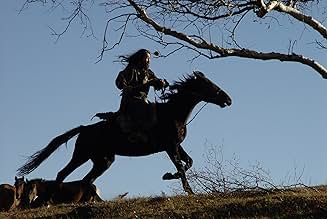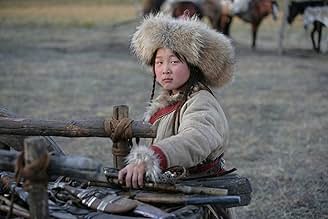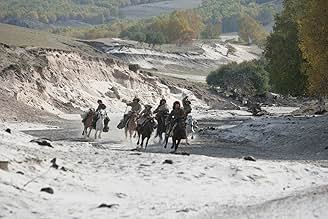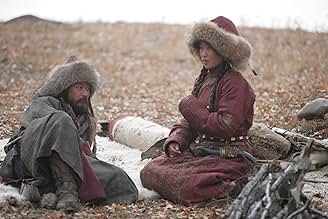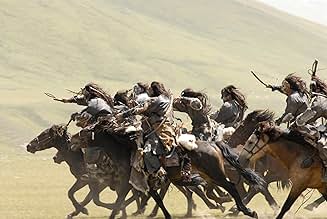PUNTUACIÓN EN IMDb
7,2/10
51 mil
TU PUNTUACIÓN
Los primeros años de la vida de Gengis Kan, que fue esclavo antes de conquistar medio mundo en 1206.Los primeros años de la vida de Gengis Kan, que fue esclavo antes de conquistar medio mundo en 1206.Los primeros años de la vida de Gengis Kan, que fue esclavo antes de conquistar medio mundo en 1206.
- Dirección
- Guión
- Reparto principal
- Nominado para 1 premio Óscar
- 16 premios y 13 nominaciones en total
Liya Ai
- Oelun - Temudjin's Mother
- (as Aliya)
Baasanjav Mijid
- Esugei - Temudjin's Father
- (as Ba Sen)
Ayuur
- Sorgan-Shira
- (as A You Er)
Huntun Batu
- Altan
- (as Hong Jong Ba Tu)
Deng Ba Te Er
- Daritai
- (as E Er Deng Ba Te Er)
Su Ya La Su Rong
- Girkhai
- (as Su You Le Si Ren)
Reseñas destacadas
I saw this last week at the Toronto film festival and loved it. Many of the people in my group did not want to see it because they were not interested in the subject matter and ended up loving the film. It seemed to be the overall favorite of the group (we saw 12 films in Toronto). There is a fair amount of blood so if one is bothered by violence, you may not enjoy it. In some ways it reminded me of Braveheart because you learned about the history, but there was also beautiful cinematography, landscapes, and very well done battle scenes. This film could possibly be in the running for the best foreign film Oscar.
To the above two comments.
You know how they say history was written by the victors? That's true for everyone but the Mongols. Most of their history was written by the Chinese, Russians, Arabs, and other conquered peoples who had an interest in perpetuating Genghis Khan = bloodthirsty savage.
The movie is based on one of the few sources about Genghis khan written in Mongolian. It's called the secret history of the Mongols and was written shortly after he died as a record for the Mongolian royal family. He was just a chieftain's's son of a very minor tribe. That's what makes this story so impressive, he didn't start out as a king or a prince with a huge army, like Alexander. Everything he had, he had to earn. He didn't get to be Genghis Khan until he was in his 30's. He was always aware of how victory wasn't assured but had to be paid for with planning and strategy. He wasn't a saint by any means but he wasn't an unthinking savage. This movie is actually meant to be the first in a trilogy with the second one probably detailing his conquest of north china and the third the conquest of the Khwarezim empire in Iran and Afghanistan.
This is an approach that I like because the Alexander movie died on account of it trying to condense all of his conquests into one movie.
You know how they say history was written by the victors? That's true for everyone but the Mongols. Most of their history was written by the Chinese, Russians, Arabs, and other conquered peoples who had an interest in perpetuating Genghis Khan = bloodthirsty savage.
The movie is based on one of the few sources about Genghis khan written in Mongolian. It's called the secret history of the Mongols and was written shortly after he died as a record for the Mongolian royal family. He was just a chieftain's's son of a very minor tribe. That's what makes this story so impressive, he didn't start out as a king or a prince with a huge army, like Alexander. Everything he had, he had to earn. He didn't get to be Genghis Khan until he was in his 30's. He was always aware of how victory wasn't assured but had to be paid for with planning and strategy. He wasn't a saint by any means but he wasn't an unthinking savage. This movie is actually meant to be the first in a trilogy with the second one probably detailing his conquest of north china and the third the conquest of the Khwarezim empire in Iran and Afghanistan.
This is an approach that I like because the Alexander movie died on account of it trying to condense all of his conquests into one movie.
Mongol (2007), was co-written and directed by Sergei Bodrov. It was filmed in Kazakhstan, and is in Mongolian with English subtitles. It's a biography of Ghenghis Khan, especially his rise to power. The movie quotes an old proverb: "Do not scorn a weak cub; he may become a brutal tiger." Actually, as portrayed in the film, Ghenghis Khan was hardly a weak cub, even as a young child. However, he certainly became a tiger when grown--whether brutal or just powerful is another question.
The film is more or less consistent with the Wikipedia report of Khan's life. He was captured and enslaved as a boy, but managed to escape and eventually conquer his local tribal enemies. (The movie portrays Ghenghis Khan as a young boy and then a young man. The film ends before we can see Khan's eventual consolidation of his huge empire.)
There is (literally) a cast of thousands. The movie is colorful, the battle scenes are graphic, and men, women, and horses all look great. The acting was excellent, especially that of Odnyam Odsuren as the young Ghenghis Khan, Tadanobu Asano as the grown man, and the beautiful Khulan Chuluun as Börte, his wife.
For political and/or esthetic reasons, Khan is portrayed as a man who brought the warring Mongolian tribes together, and as a lawgiver and just ruler. I don't have enough knowledge of the period to know whether the people of his empire would have taken this view. However, this is a movie, not a Ph.D. dissertation, so I accepted it as an action-filled and enjoyable--if not profound--film.
We saw this film at the excellent Rochester High Falls International Film Festival. Because of the sweeping nature of the battles, and the glorious shots of the landscape, this movie will lose a lot on DVD. Try to see it in a theater, preferably one with a large screen.
The film is more or less consistent with the Wikipedia report of Khan's life. He was captured and enslaved as a boy, but managed to escape and eventually conquer his local tribal enemies. (The movie portrays Ghenghis Khan as a young boy and then a young man. The film ends before we can see Khan's eventual consolidation of his huge empire.)
There is (literally) a cast of thousands. The movie is colorful, the battle scenes are graphic, and men, women, and horses all look great. The acting was excellent, especially that of Odnyam Odsuren as the young Ghenghis Khan, Tadanobu Asano as the grown man, and the beautiful Khulan Chuluun as Börte, his wife.
For political and/or esthetic reasons, Khan is portrayed as a man who brought the warring Mongolian tribes together, and as a lawgiver and just ruler. I don't have enough knowledge of the period to know whether the people of his empire would have taken this view. However, this is a movie, not a Ph.D. dissertation, so I accepted it as an action-filled and enjoyable--if not profound--film.
We saw this film at the excellent Rochester High Falls International Film Festival. Because of the sweeping nature of the battles, and the glorious shots of the landscape, this movie will lose a lot on DVD. Try to see it in a theater, preferably one with a large screen.
This film is an example of an extremely strong narrative accompanied by excellent cinematography and superbly executed war scenes... reminds me of Saving Pvt Ryan without all the bangs and clatter. The acting is also commendable. There seems to be a great deal of research that has gone into the subject and is a great eduction on the early life of Chengiz Khan. I wish there was more, but for the integrity of the subject I think the makers have done justice to the story. Would really appreciate if this made into a trilogy, but I don't think the film makers have left any scope to stretch it further. They have compressed a epic life tale into a little more than an hour and a half and with great flair and ease which is calls for a standing ovation. Lesson to Indian Film makers!!!
Astonishingly, the name and the person of Genghis Khan in Sergei Bodrov's "Mongol," a great, Shakespearean drama about this seminal figure in history, don't appear until the very end of the two-hour epic. Instead, we see Temudjin, the man yet to become (posthumously) Khagan (emperor) of what was to be for several centuries the largest contiguous empire in history. Whether Bodrov completes the contemplated two additional chapters of the story or not, "Mongol" stands on its own as a masterpiece.
Contradicting the Western (and Russian) image of Genghis as the monstrous conqueror, Bodrov's work is influenced by Lev Gumilev's "The Legend of the Black Arrow" and is based on "The Secret History of the Mongols," the 13th century Mongolian account, unknown until its re-emergence in China 700 years later. For a director, who learned in school only about the horrors of Russia's 200-year subjugation by the Mongols, taking a "larger view" is a remarkable act.
Unlike Omar Sharif in the 1965 Henry Levin "Genghis Khan" or Takashi Sorimachi in Shinichiro Sawai's disappointing 2007 "To the Ends of the Earth and Sea," Tadanobu Asano in Bodrov's film is strictly Temudjin, not the great Khan. He lived from 1162 to 1227, and "Mongol" covers the years between 1171 and the beginning of the unification of Mongolian tribes around the turn of the century.
In fact, the spookily powerful child Temudjin (Odnyam Odsuren) dominates the first part of the film, undergoing trials and tribulations that make the lives of Dickens' abused and imperiled children look like a picnic. From age nine into his 30s, Temudjin was orphaned, hunted, imprisoned, enslaved, and constantly threatened by extinction. Literally alone in the vast landscape (brilliantly photographed by Rogier Stoffers and Sergei Trofimov), Temudjin escapes death repeatedly, at times almost mysteriously.
"Mongol" is huge - with endless vistas and epic crowd scenes, quite without special effects - but Bodrov keeps the setting just that, never strutting visuals for their own sake. The film is about people, and the cast is magnificent. Asano's face and eyes hold attention, and make the viewer experience simultaneous feelings of getting to know the character he plays and being held at arm's length. Bodrov and Asano escape all the many Hollywood pitfalls in making an epic - they present nothing easy, predictable, trite. The term "Shakespearean" is used here advisedly.
The Mongolian actors are sensational: Khulan Chuluun is luminous as Borte, Temudjin's wife; Borte's 10-year-old self, the girl who chooses Temudjin, then 9, while he thinks he is the one making the decision, is unforgettable, even if the name is hard to remember: Bayertsetseg Erdenebat.
Chinese actors are vital to the film. As Temudjin's father (poisoned by Tatars before the boy reached 10), Sai Xing Ga makes an impression few actors can achieve in such a brief appearance. Nearly overshadowing Asano is the grand thespian exercise from Sun Hong-Lei, as Temudjin's all-important blood brother Jamukha. Sun is almost too big for the big screen, perhaps a less intense performance would have served the film better.
Another problem is near the end of "Mongol," with Borte's stranger-than-fiction (and actually fictional) rescue of Temudjin from a Tangut prison, years, hundreds of miles, and impossible alliances and dalliances telescoped into a few near-incongruous minutes - all to cover a 10-year-long gap in Genghis' history. Except for that, however, Bodrov's work is engrossing, spectacular, and memorable.
Contradicting the Western (and Russian) image of Genghis as the monstrous conqueror, Bodrov's work is influenced by Lev Gumilev's "The Legend of the Black Arrow" and is based on "The Secret History of the Mongols," the 13th century Mongolian account, unknown until its re-emergence in China 700 years later. For a director, who learned in school only about the horrors of Russia's 200-year subjugation by the Mongols, taking a "larger view" is a remarkable act.
Unlike Omar Sharif in the 1965 Henry Levin "Genghis Khan" or Takashi Sorimachi in Shinichiro Sawai's disappointing 2007 "To the Ends of the Earth and Sea," Tadanobu Asano in Bodrov's film is strictly Temudjin, not the great Khan. He lived from 1162 to 1227, and "Mongol" covers the years between 1171 and the beginning of the unification of Mongolian tribes around the turn of the century.
In fact, the spookily powerful child Temudjin (Odnyam Odsuren) dominates the first part of the film, undergoing trials and tribulations that make the lives of Dickens' abused and imperiled children look like a picnic. From age nine into his 30s, Temudjin was orphaned, hunted, imprisoned, enslaved, and constantly threatened by extinction. Literally alone in the vast landscape (brilliantly photographed by Rogier Stoffers and Sergei Trofimov), Temudjin escapes death repeatedly, at times almost mysteriously.
"Mongol" is huge - with endless vistas and epic crowd scenes, quite without special effects - but Bodrov keeps the setting just that, never strutting visuals for their own sake. The film is about people, and the cast is magnificent. Asano's face and eyes hold attention, and make the viewer experience simultaneous feelings of getting to know the character he plays and being held at arm's length. Bodrov and Asano escape all the many Hollywood pitfalls in making an epic - they present nothing easy, predictable, trite. The term "Shakespearean" is used here advisedly.
The Mongolian actors are sensational: Khulan Chuluun is luminous as Borte, Temudjin's wife; Borte's 10-year-old self, the girl who chooses Temudjin, then 9, while he thinks he is the one making the decision, is unforgettable, even if the name is hard to remember: Bayertsetseg Erdenebat.
Chinese actors are vital to the film. As Temudjin's father (poisoned by Tatars before the boy reached 10), Sai Xing Ga makes an impression few actors can achieve in such a brief appearance. Nearly overshadowing Asano is the grand thespian exercise from Sun Hong-Lei, as Temudjin's all-important blood brother Jamukha. Sun is almost too big for the big screen, perhaps a less intense performance would have served the film better.
Another problem is near the end of "Mongol," with Borte's stranger-than-fiction (and actually fictional) rescue of Temudjin from a Tangut prison, years, hundreds of miles, and impossible alliances and dalliances telescoped into a few near-incongruous minutes - all to cover a 10-year-long gap in Genghis' history. Except for that, however, Bodrov's work is engrossing, spectacular, and memorable.
¿Sabías que...?
- CuriosidadesDirector Sergei Bodrov and Production Designer Dashi Namdakov visited Mongolia's chief shaman in the capital city of Ulan Bator, so that they could ask permission to film a movie about Genghis Khan's life. The shaman told them that of all the people who have talked about making such a film, they were the only ones to ask his permission.
- PifiasThe Mongolian tribes, including the hordes that conquered their vast empire, rode on a very peculiar race of horses, stocky build, with relatively short legs and a large head. The horses used in the movie look like ordinary western horses
- ConexionesFeatured in The 80th Annual Academy Awards (2008)
- Banda sonoraBeginning
Composed By Tuomas Kantelinen
Performed by Hamburg Film Orchestra, The London Session Orchestra, One Orchestra, Altan Urag
© 2008 X-Filme Creative Pool GmbH.
(p) 2008 Kinofabrika GmbH & Tuomas Kantelinen Ensemble.
Selecciones populares
Inicia sesión para calificar y añadir a tu lista para recibir recomendaciones personalizadas
Detalles
- Fecha de lanzamiento
- Países de origen
- Idiomas
- Títulos en diferentes países
- Mongol: The Rise of Genghis Khan
- Localizaciones del rodaje
- Inner Mongolia, China(location)
- Empresas productoras
- Ver más compañías en los créditos en IMDbPro
Taquilla
- Presupuesto
- 18.000.000 US$ (estimación)
- Recaudación en Estados Unidos y Canadá
- 5.705.761 US$
- Fin de semana de estreno en EE. UU. y Canadá
- 135.326 US$
- 8 jun 2008
- Recaudación en todo el mundo
- 26.527.510 US$
- Duración2 horas 6 minutos
- Color
- Mezcla de sonido
- Relación de aspecto
- 2.35 : 1
Contribuir a esta página
Sugerir un cambio o añadir el contenido que falta

Principal laguna de datos
What was the official certification given to Mongol (2007) in Brazil?
Responde






